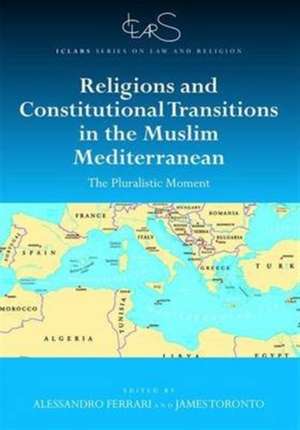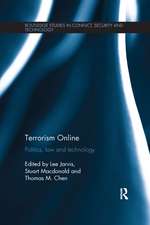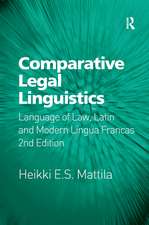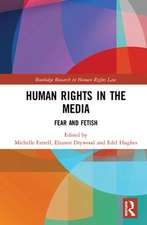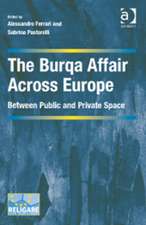Religions and Constitutional Transitions in the Muslim Mediterranean: The Pluralistic Moment: ICLARS Series on Law and Religion
Editat de Alessandro Ferrari, James Torontoen Limba Engleză Hardback – 14 sep 2016
| Toate formatele și edițiile | Preț | Express |
|---|---|---|
| Paperback (1) | 298.19 lei 6-8 săpt. | |
| Taylor & Francis – 8 iun 2018 | 298.19 lei 6-8 săpt. | |
| Hardback (1) | 848.54 lei 6-8 săpt. | |
| Taylor & Francis – 14 sep 2016 | 848.54 lei 6-8 săpt. |
Din seria ICLARS Series on Law and Religion
-
 Preț: 324.03 lei
Preț: 324.03 lei - 19%
 Preț: 259.51 lei
Preț: 259.51 lei -
 Preț: 312.12 lei
Preț: 312.12 lei -
 Preț: 310.41 lei
Preț: 310.41 lei -
 Preț: 310.95 lei
Preț: 310.95 lei -
 Preț: 387.75 lei
Preț: 387.75 lei -
 Preț: 284.78 lei
Preț: 284.78 lei -
 Preț: 385.47 lei
Preț: 385.47 lei - 18%
 Preț: 892.16 lei
Preț: 892.16 lei - 12%
 Preț: 303.22 lei
Preț: 303.22 lei - 17%
 Preț: 259.98 lei
Preț: 259.98 lei - 17%
 Preț: 259.98 lei
Preț: 259.98 lei -
 Preț: 386.51 lei
Preț: 386.51 lei -
 Preț: 387.87 lei
Preț: 387.87 lei - 17%
 Preț: 259.98 lei
Preț: 259.98 lei -
 Preț: 388.68 lei
Preț: 388.68 lei - 17%
 Preț: 259.92 lei
Preț: 259.92 lei - 18%
 Preț: 1001.07 lei
Preț: 1001.07 lei - 18%
 Preț: 1006.07 lei
Preț: 1006.07 lei - 17%
 Preț: 257.08 lei
Preț: 257.08 lei -
 Preț: 381.59 lei
Preț: 381.59 lei - 17%
 Preț: 256.87 lei
Preț: 256.87 lei - 12%
 Preț: 299.25 lei
Preț: 299.25 lei - 17%
 Preț: 258.09 lei
Preț: 258.09 lei -
 Preț: 393.52 lei
Preț: 393.52 lei - 13%
 Preț: 298.19 lei
Preț: 298.19 lei - 18%
 Preț: 901.35 lei
Preț: 901.35 lei - 19%
 Preț: 255.66 lei
Preț: 255.66 lei - 18%
 Preț: 1000.27 lei
Preț: 1000.27 lei - 18%
 Preț: 1004.86 lei
Preț: 1004.86 lei - 18%
 Preț: 1000.27 lei
Preț: 1000.27 lei
Preț: 848.54 lei
Preț vechi: 1140.92 lei
-26% Nou
Puncte Express: 1273
Preț estimativ în valută:
162.37€ • 169.95$ • 135.14£
162.37€ • 169.95$ • 135.14£
Carte tipărită la comandă
Livrare economică 01-15 aprilie
Preluare comenzi: 021 569.72.76
Specificații
ISBN-13: 9781472457561
ISBN-10: 1472457560
Pagini: 212
Dimensiuni: 174 x 246 x 18 mm
Greutate: 0.5 kg
Ediția:1
Editura: Taylor & Francis
Colecția Routledge
Seria ICLARS Series on Law and Religion
Locul publicării:Oxford, United Kingdom
ISBN-10: 1472457560
Pagini: 212
Dimensiuni: 174 x 246 x 18 mm
Greutate: 0.5 kg
Ediția:1
Editura: Taylor & Francis
Colecția Routledge
Seria ICLARS Series on Law and Religion
Locul publicării:Oxford, United Kingdom
Cuprins
Preface Alessandro Ferrari – James A. Toronto
Part 1: The General Framework
Ch. 1 - Dynamics of Religious Freedom in the two Sides of Mediterranean: an Interconnected History, Alessandro Ferrari (Università degli Studi dell’Insubria)
Ch. 2 - Religion(s),Religious Freedom and State Transformations: the European Side, Silvio Ferrari(Università degli Studi di Milano)
Ch. 3 - The Historical Compromise between "Civil State" and Religion in Post-revolutionary Arab Constitutionalism, Yadh Ben Achour (President of Tunisia's Higher Political Reform Commission and Vice Chair of the U.N. Human Rights Committee)
Part II: National Cases
Tunisia
Ch. 4 - Introduction. The Tunisian Case: A Secular Islam ?, Massimo Campanini (Università degli Studi di Trento)
Ch. 5 - Some Thoughts on Religion in the 2014 Tunisian Constitution, Ghazi Gherairi (Université de Carthage)
Ch. 6 - Components of Political Islam in Tunisia: the Test of Transition, (Chérif Ferjani, MSH Maison de l’Orient et de la Méditerranée)
Ch. 7 - Religious Freedom in Tunisia: the Scope of Ambivalence, Jinan Liman (Université de Tunis)
Turkey
Ch. 8 - Turkey: Introduction, Rossella Bottoni (Università cattolica del Sacro Cuore)
Ch. 9 - Turkish Law and Religious Issues, Emre Öktem (Galatasaray University, Istanbul)
Ch. 10 - The Experience of the AKP: from the Origins to Present Times, Ihsan Yilmaz (Fatih University, Istanbul)
Morocco
Ch. 11 - Morocco: Introduction,Roberta Aluffi (Università degli Studi di Torino)
Ch. 12 - Is the "Religious Framework" of Morocco’s Party of Justice and Development a Political Tactic or a Sign of Normalization?, Amal Idrissi (Moulay Ismail University, Meknès)
Ch. 13 - Religious Pluralism and Freedom of Conscience in a Muslim Context. The Case of Morocco, MohammedMouaquit (Université Hassan II, Casablanca)
Algeria, Egypt and Palestine
Ch. 14 - Introduction to Algeria, Egypt and Palestine with some reference to the Jordan case, Anne Fornerod (MISHA-CNRS Strasbourg)
Ch. 15 - The Treatment of the Relationship Between Islam and the State in the Algerian Fundamental Texts From 1962 To 2012, Souad Ghaouti (Université d’Alger)
Ch. 16 - Freedom of Religion and the Constitution in Egypt: The Distinction Between Belief and Practice, and Protecting Religion and Government from Each Other, David Risley (U. S. Department of Justice)
Ch. 17 - Religious Law in the West Bank and Gaza, Moussa Abou Ramadan (MISHA-CNRS Strasbourg)
Part 1: The General Framework
Ch. 1 - Dynamics of Religious Freedom in the two Sides of Mediterranean: an Interconnected History, Alessandro Ferrari (Università degli Studi dell’Insubria)
Ch. 2 - Religion(s),Religious Freedom and State Transformations: the European Side, Silvio Ferrari(Università degli Studi di Milano)
Ch. 3 - The Historical Compromise between "Civil State" and Religion in Post-revolutionary Arab Constitutionalism, Yadh Ben Achour (President of Tunisia's Higher Political Reform Commission and Vice Chair of the U.N. Human Rights Committee)
Part II: National Cases
Tunisia
Ch. 4 - Introduction. The Tunisian Case: A Secular Islam ?, Massimo Campanini (Università degli Studi di Trento)
Ch. 5 - Some Thoughts on Religion in the 2014 Tunisian Constitution, Ghazi Gherairi (Université de Carthage)
Ch. 6 - Components of Political Islam in Tunisia: the Test of Transition, (Chérif Ferjani, MSH Maison de l’Orient et de la Méditerranée)
Ch. 7 - Religious Freedom in Tunisia: the Scope of Ambivalence, Jinan Liman (Université de Tunis)
Turkey
Ch. 8 - Turkey: Introduction, Rossella Bottoni (Università cattolica del Sacro Cuore)
Ch. 9 - Turkish Law and Religious Issues, Emre Öktem (Galatasaray University, Istanbul)
Ch. 10 - The Experience of the AKP: from the Origins to Present Times, Ihsan Yilmaz (Fatih University, Istanbul)
Morocco
Ch. 11 - Morocco: Introduction,Roberta Aluffi (Università degli Studi di Torino)
Ch. 12 - Is the "Religious Framework" of Morocco’s Party of Justice and Development a Political Tactic or a Sign of Normalization?, Amal Idrissi (Moulay Ismail University, Meknès)
Ch. 13 - Religious Pluralism and Freedom of Conscience in a Muslim Context. The Case of Morocco, MohammedMouaquit (Université Hassan II, Casablanca)
Algeria, Egypt and Palestine
Ch. 14 - Introduction to Algeria, Egypt and Palestine with some reference to the Jordan case, Anne Fornerod (MISHA-CNRS Strasbourg)
Ch. 15 - The Treatment of the Relationship Between Islam and the State in the Algerian Fundamental Texts From 1962 To 2012, Souad Ghaouti (Université d’Alger)
Ch. 16 - Freedom of Religion and the Constitution in Egypt: The Distinction Between Belief and Practice, and Protecting Religion and Government from Each Other, David Risley (U. S. Department of Justice)
Ch. 17 - Religious Law in the West Bank and Gaza, Moussa Abou Ramadan (MISHA-CNRS Strasbourg)
Notă biografică
Alessandro Ferrari is Associate Professor at the Department of Law, Economy and Cultures of the University of Insubria where he teaches Law and Religion, Comparative Religious Laws and Mediterranean Islam. He is scientific director of the Research Centre "Religion, Law and Economy in Mediterranean Area" (REDESM) of the same University. He teaches at the Research Master "Islamologie, Droit et Gestion" at the University of Strasbourg and he has been Roberta Buffet Visiting Professor at the Northwestern University in 2014 (classes on Islam in Europe and Islam and Contemporary Constitutional Changes in Mena countries). He is member of the editorial Board of the journal Quaderni di Diritto e Politica Ecclesiastica. His most recent research interests and publications focus on secularism, laïcité, citizenship and Mediterranean religious freedom and constitutional transitions in the MENA countries.
James Toronto is Associate Professor of Arabic and Islamic Studies, and Senior Fellow in Islamic Studies at the International Center for Law and Religion Studies at Brigham Young University, USA. He teaches courses in Islamic religion and humanities, and Arabic language and literature. He has served as the Director of BYU’s Center for Cultural and Educational Affairs in Amman, Jordan. His research and publications focus on issues of Islamic education, legal status of religious minorities in the Middle East, and Muslim immigration in Europe.
James Toronto is Associate Professor of Arabic and Islamic Studies, and Senior Fellow in Islamic Studies at the International Center for Law and Religion Studies at Brigham Young University, USA. He teaches courses in Islamic religion and humanities, and Arabic language and literature. He has served as the Director of BYU’s Center for Cultural and Educational Affairs in Amman, Jordan. His research and publications focus on issues of Islamic education, legal status of religious minorities in the Middle East, and Muslim immigration in Europe.
Recenzii
In times of stereotyping Islam and its political ambitions, this is a more than timely volume. The thorough studies presented by renowned scholars shed light on the complex interplay between religion, its role in society and politics, and the vast range of varieties in regulating the relationship between state law and religion. An outstanding scientific work!
Professor Mathias Rohe, University of Erlangen-Nuremberg, Germany
At a moment when discussions of Islam and politics are often driven by fear and misunderstanding, Ferrari and Toronto offer a compelling alternative in this study of the entangled histories of religion, law, and state on the northern and southern shores of the Mediterranean. This book charts a new and ambitious path for the comparative study of religion and constitutional law in Europe and the Middle East.
Professor Elizabeth Shakman Hurd, Northwestern University, USA
Professor Mathias Rohe, University of Erlangen-Nuremberg, Germany
At a moment when discussions of Islam and politics are often driven by fear and misunderstanding, Ferrari and Toronto offer a compelling alternative in this study of the entangled histories of religion, law, and state on the northern and southern shores of the Mediterranean. This book charts a new and ambitious path for the comparative study of religion and constitutional law in Europe and the Middle East.
Professor Elizabeth Shakman Hurd, Northwestern University, USA
Descriere
This book investigates the role of Islam and religious freedom in the constitutional transitions of seven North African and Middle Eastern countries. Taking an interdisciplinary approach, the work investigates the role of Islam as a political, institutional and societal force. By analyzing three different topics – Islam and Constitutionalism, Religious Political Parties, and Religious Freedom – the book offers a dynamic picture of the role played by Islam and religious freedom in the process of state-building in a globalized age in which human rights and pluralism are crucial dimensions.
